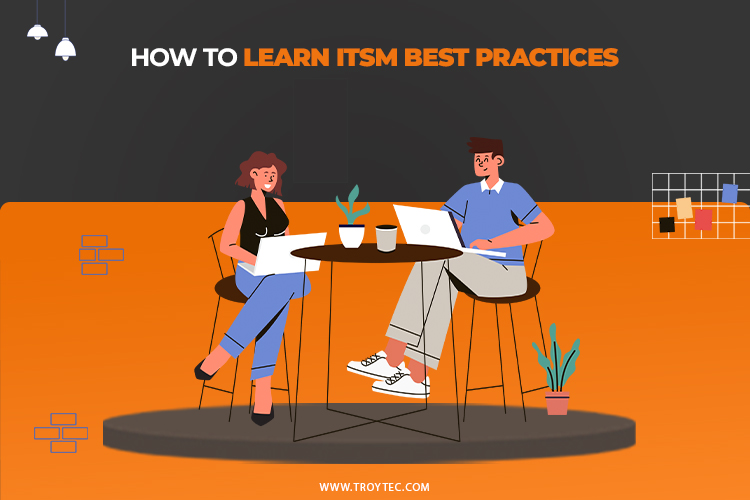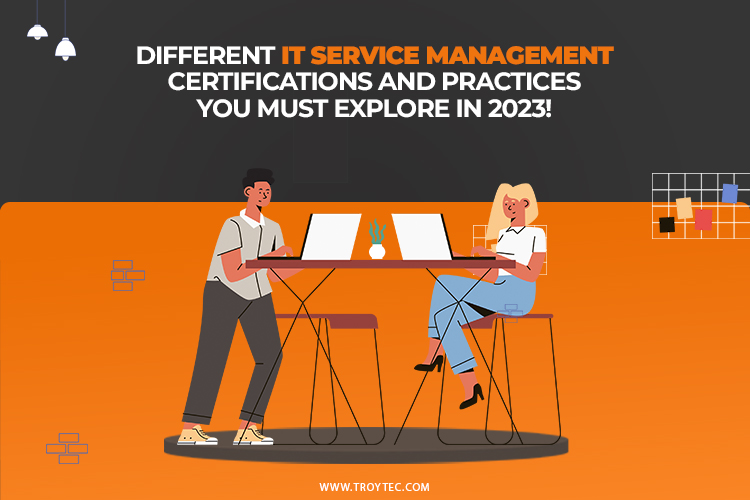Different IT Service Management Certifications and Practices You Must Learn
IT Service Management, also known as ITSM, encompasses all aspects of IT activity, including policies, procedure integration and coordination, and supporting sub-routines. To organize, deliver, and manage IT services to customers, these procedures are handled either by an entire company or a subset of an organization.
It is thus concerned with providing high-quality IT services to the customer through well-structured systems and practices. Employers view holders of IT service management certifications as experts who can integrate corporate strategy and information technology. You can manage, plan, and execute quality IT services as a certified candidate. There is also IT service management best practice that you can utilize to become the highest-paid employee.
Keep reading the article to explore and learn more about best practices in IT service management and how you can learn ITSM best practices.
What is IT Service Management?
IT service management, also known as ITSM, is simply the process by which IT teams maintain the end-to-end delivery of information technology services to customers. This includes all the activities and processes involved in designing, developing, delivering, and supporting IT services.
The assumption that IT should be supplied as a service is central to ITSM. A typical ITSM situation might entail requesting new hardware, such as a laptop. You would send your application via a portal, stuffing out a ticket with all pertinent information and initiating a repeatable workflow. The key would then be routed to the IT team’s queue, where immediate precedes are prioritized and addressed.
People frequently misinterpret ITSM as essential IT support compared to their day-to-day contacts with IT. ITSM teams, on the other hand, manage all types of workplace tech, from laptop computers to servers to mission-critical software applications.
In the IT sector, there is a common belief that the best approach to ITSM should consist of three steps in this sequence:
- Build and incorporate IT technology.
- Implement and enforce the proper procedure.
- People are capable of learning the technology and adhering to the process. Atlassian challenges that assumption.
Why is IT Service Management Certifications Important?

ITSM is advantageous to your IT team, and process improvement principles can benefit your entire organization. ITSM increases productivity. An organized approach to service management also aligns IT with business objectives by standardizing service delivery based on expenditures, resources, and results. It lowers costs and risks while also improving the customer experience.
Some of the most prevalent ITSM benefits we’ve discovered include the following:
- Aligning IT team members with business priorities, as measured by success metrics
- Facilitating cross-departmental collaboration
- Bringing together IT and development teams through simplified project management methods
- enabling IT teams to share information and continuously enhance
- Improving request cooperation for better service
- Increasing customer-centricity through self-service and improved processes
- Responding to critical crises more quickly
- Next, we will discuss IT service management certifications and ITSM best practices.
What is the IT Service Management Best Practice?
IT Service Management (ITSM) is a crucial aspect of modern-day business operations. It involves planning, delivering, and supporting information technology (IT) services to meet the needs of the business.

With the rapid advancement in technology and the increasing reliance on IT services, it has become imperative to adopt best practices for ITSM to ensure effective and efficient IT service delivery.
ITSM Best Practices
1. Service Strategy: The service strategy should align with the overall business strategy and objectives. It should be based on a thorough understanding of the customer’s needs and requirements and consider the IT services’ cost, risks, and benefits.
2. Service Design: The service design should be based on industry standards and best practices and ensure the delivery of high-quality, reliable, and secure IT services.
3. Service Transition: The service transition should be planned and managed to minimize disruptions and ensure a seamless transition to the new or modified IT services.
4. Service Operation: The service operation should be optimized to deliver IT services efficiently and effectively and to minimize downtime and disruption.
5. Continual Service Improvement: The ITSM process should be continuously improved to meet changing business needs and keep up with technological advancements. It is the IT service management best practice.
How to Learn ITSM Best Practices
To learn ITSM best practices, organizations can adopt a formal ITSM framework such as ITIL, COBIT, or ISO 20000.

These frameworks provide a comprehensive set of ITSM best practices, processes, and procedures for ITSM. Additionally, organizations can attend ITSM training and certification programs, read industry publications and attend conferences to keep up with the latest developments in ITSM. Here is the detailed note on different IT service management certifications.
Different IT Service Management Certifications
Here is the list of top IT service management certifications which provide best practice IT service management.
ITIL: Information Technology Infrastructure Library or ITIL is a universally recognized context for IT service management. ITIL provides a comprehensive approach to delivering IT services and covers the entire service lifecycle.
COBIT: COBIT is a framework that enables organizations to align their IT services with their business objectives.
ISO 20000: ISO 20000 is an international standard that outlines the requirements for an ITSM system. This certification helps organizations demonstrate their commitment to ITSM best practices and the delivery of high-quality IT services.
The Benefits of ITSM Certifications
Career Advancement: By obtaining an ITSM certification, individuals can enhance their careers in IT service delivery and increase their job opportunities.
Improved Skills and Knowledge: ITSM certifications provide individuals with the latest best practices, processes, and procedures for delivering IT services, which enhances their skills and knowledge.
Enhanced Service Delivery: Organizations that adopt ITSM certifications can expand the quality and efficiency of their IT service delivery, leading to increased customer satisfaction and better business outcomes.
Increased Credibility: ITSM certifications demonstrate an individual’s commitment to delivering high-quality IT services, which enhances their credibility in the eyes of potential employers and customers.
Conclusion
In conclusion, ITSM certifications provide individuals with the knowledge and skills to deliver high-quality IT services and organizations with the framework to align their IT services with their business objectives. By obtaining an ITSM certification, individuals can advance their careers, and organizations can improve their IT service delivery, leading to increased customer satisfaction and better business outcomes.
Individuals and organizations should consider obtaining an ITSM certification to stay competitive in today’s technology-driven business environment. We’ve discussed how to learn ITSM best practices. Comment below your questions or confusion related to IT service management certifications or IT service management best practices.

